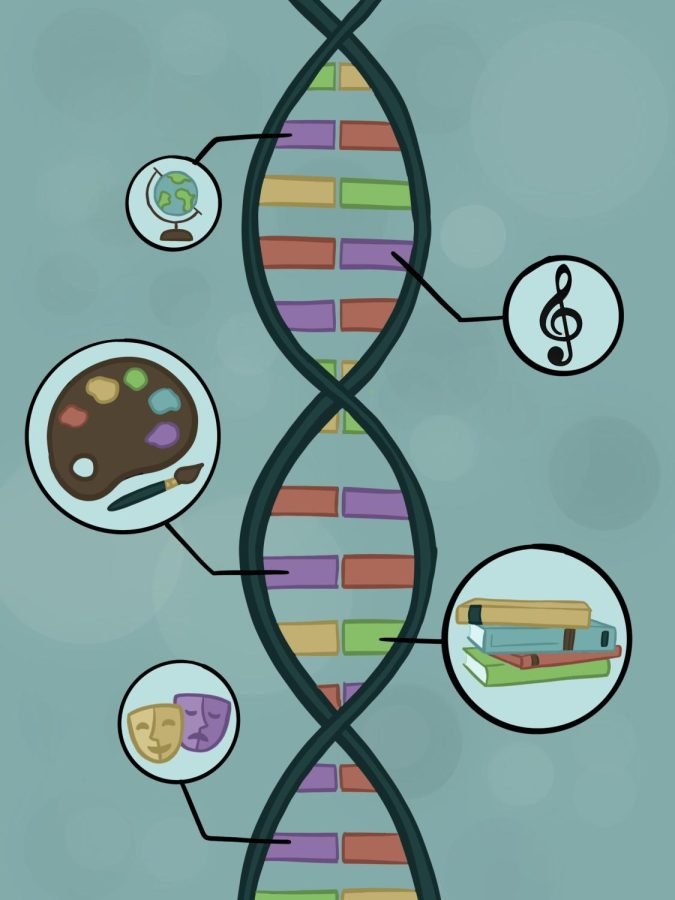Humanities vs. STEM
A look into the divide between different career paths.
For many students, high school marks the beginning of the never-ending stream of career-related questions. From teachers, parents, aunts and even family doctors, students are faced with the heart-dropping words: “What do you want to be when you grow up?” As awkward and acne-faced teenagers, students are expected to make life-altering decisions before adulthood.
The dynamic of careers has shifted dramatically in the past couple of decades. With new technological advancements came the development of STEM as a major. Introduced in 2001 by the National Science Foundation, STEM refers to any field centered around science, technology, engineering and mathematics.
Junior Prisha Kumar hopes to pursue computer science in the future. She shares her insight on what drew her to the career.
“I think it was the thrill that it’s so unexpected,” Kumar said. “Everything else felt like you already know what’s out there, you already know what you’re studying. Versus computer science felt like you don’t know what’s there, you have to find out what’s there. It’s something you’re working towards, not a defined answer.”
According to The U.S. Bureau of Labor Statistics, STEM-related occupations are expected to grow eight percent by 2029. Kumar adds to her thoughts about the field.
“STEM is something I definitely think everyone can do if they find the right calling if they find the right place to start,” she said. “In general, it’s a lot more creative than people think it is!”
STEM offers a lot to society, encompassing many essential jobs, such as engineers, physicists, and scientists. However, STEM has created a competitive atmosphere for many other majors, especially those that are considered ‘unconventional,” such as those in the humanities field. Humanities is a vast field containing many degrees such as history, philosophy, religion, fine arts, cultural studies, education and much more. Due to their artistic nature, many humanities majors may suffer criticism for their career choices.
History teacher Scott Gibbons reveals some reactions he’s received for his occupation.
“Across the board, I did not have any or had very little pushback from friends, family, peers, except the family of my girlfriend at the time was a little concerned about me not going into STEM,” he said. “There was a little bit of that ‘just a teacher?'”
Due to Troy High School’s diverse nature, matters of class, race, and stability come into play for many students when choosing a major.
“There are plenty of lucrative careers in the humanities as well that a lot of people aren’t aware of,” Gibbons adds. “[Troy High School] community specifically, so many of our student’s parents are doctors, engineers, are in the STEM field that it would be easy to see their parent’s relatives’ success and equate that with ‘that is the only path to success.’”
Senior Hannah Kim, who hopes to have a future in game design, shares her insight on career decisions.
“It’s more important to go into what you’re passionate about, but I can have that point of view because I’m very privileged,” she said. “I have the funds to go into art and do the stuff I’m passionate about.”
Over the past two decades, the Institute of Education Sciences found that tuition costs in America have increased dramatically by nearly 53 percent, with the average tuition for a four-year institution costing around $18,764 in 2000 to approximately $28,775 in 2020.
“College is a huge financial investment, and there are many families for whom they want to see a fiscal return on that investment, and the clearest fiscal return is gonna be in STEM,” Gibbons explains. “I think parents want to support their children’s dreams, but at the same time, with the cost of college the way it is, it can be difficult to fully get behind your child’s dreams when you don’t see a financial light at the end of that tunnel.”
While STEM careers provide slightly higher levels of personal income, a recent study titled “STEM or Humanities? Toward a Balance of Interest Fit” found that job satisfaction and well-being also play a significant role in determining personal income.
“The great misconception about humanities is that it’s difficult to make a financial gain,” Gibbons said. “I would argue that you can be financially successful in most things that you’re passionate about. You’ll find the angle; you’ll find the system. You’ll find the niche that gets you that financial success in that passion if you’re willing to stick it out.”
Senior Jonah Midtgard states, “The tone of an arts major is shifting a little bit.” He explains that people are beginning to appreciate the cultural and societal impact arts and humanities have on the world. “Obviously, doctors save lives, but musicians, they entertain lives,” he said.
Kumar states the importance of STEM comes from their ability to solve worldly issues. However, she also believes that they can only find solutions with the help of the humanities.
“[Humanities] take these issues, and they expand on it,” she explains. “Humanities will find an issue, and they will find a way to get people thinking about it through arts, literature, philosophy. They’ll make sure everyone knows about it, which I think that’s part of the reason STEM is successful. Enough people know. Therefore, you are growing; therefore, this progression is happening.”
Both STEM and humanities are crucial to creating a healthy society. However, Gibbons explains the importance of technical careers in completing projects.
“At the end of the day, the STEM students can come up with these ideas, and the humanities students can put them into context, but somebody has to actually physically do the work,” Gibbons said. “So if there is a group that is marginalized or seen as less than, I would argue it’s the hands-on technical students. We need electricians, we need the [mechanics], and the district has been investing heavily in those fields after decades of neglect, so even the district realizes those fields need to be boosted.”
The U.S. Bureau of Labor Statistics estimates that mechanical engineering, technicians, and other trade school careers are to grow by only two percent in the next decade, as compared to the average of five percent for other careers.
Senior Elijah Gorden Guzick, who hopes to pursue chemistry in the future, shares his opinion on why people tend to favor some careers.
“Ever since we were kids, we were taught that education is important, that you need to go to a good college, especially in a place like Troy High School,” he said. “It’s seen as something super respectable [when] you need a high level of education.”
Society has taught students to value education above all, to equate high levels of education and personal income with success. However, setting a restricted definition to success could be detrimental to young students who are unable to fit in that mold.
Your donation will support the student journalists of Troy High School - MI. Your contribution will allow us to print our work, purchase equipment and cover our annual website hosting costs.



